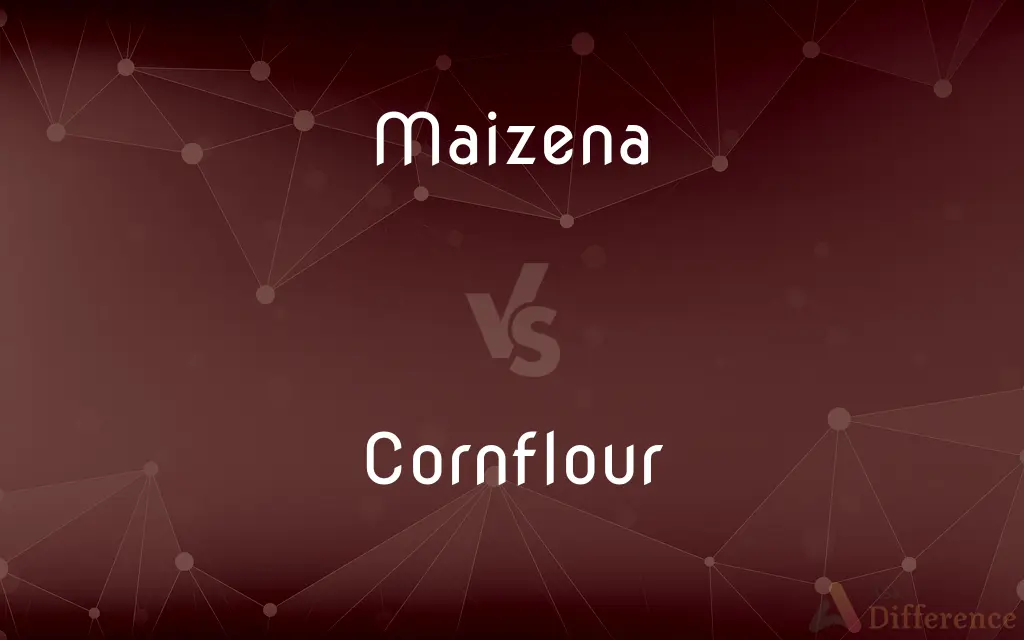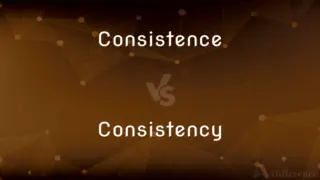Maizena vs. Cornflour — What's the Difference?
Edited by Tayyaba Rehman — By Fiza Rafique — Updated on November 3, 2023
Maizena is a brand name for a cornstarch product. Cornflour is a fine powder made from ground corn, used as a thickening agent.

Difference Between Maizena and Cornflour
Table of Contents
ADVERTISEMENT
Key Differences
Maizena refers to a brand of cornstarch popular in several countries, known for its use as a thickening agent in cooking. Cornflour is a term used predominantly in the UK and some Commonwealth countries to describe the same fine, powdery substance derived from corn used for similar culinary purposes. Maizena, as a brand, is sometimes synonymous with cornstarch in areas where the brand is dominant.
Cornflour is the generic term for the powder obtained from maize used in cooking to thicken sauces and soups. Maizena, as a proprietary eponym, has become a commonly used term for cornstarch in regions like Latin America and Europe, similar to how the brand Kleenex is used to refer to tissues in the United States.
In recipes, Maizena and cornflour can be used interchangeably, as they perform the same function in cooking. While Maizena refers specifically to the product made by the company bearing that name, cornflour is a common ingredient without brand specificity. Both are gluten-free and used to provide a smooth texture to various dishes.
When it comes to purchasing, consumers might find cornflour labeled as such in the baking aisle of any grocery store worldwide, whereas Maizena will be found in regions where the brand is marketed. Packaging and branding differentiate Maizena from store-brand or other branded cornflour products.
Despite the differences in terminology, both Maizena and cornflour are essential in cooking for creating a non-grainy, clear thickening for sauces and fillings. Whether one uses Maizena or another brand of cornflour, the result should be the same smooth, thickened consistency that chefs and home cooks desire in their culinary creations.
ADVERTISEMENT
Comparison Chart
Definition
Brand name of cornstarch.
Generic term for corn-derived starch.
Global Recognition
Known in specific regions.
Known internationally.
Usage
Used as a thickening agent.
Used as a thickening agent.
Availability
Available where the brand is sold.
Widely available in many stores.
Linguistic Usage
Often used synonymously with cornstarch in certain areas.
Used to refer to the product itself.
Compare with Definitions
Maizena
A trademarked cornstarch brand.
She thickened the gravy with Maizena.
Cornflour
A fine starch made from corn.
The recipe calls for cornflour as a thickener.
Maizena
Used as a thickener in recipes.
I need Maizena to thicken the soup.
Cornflour
Gives a glossy finish to sauces.
A tablespoon of cornflour will make the sauce glossy.
Maizena
Known for its smooth consistency in sauces.
Maizena always gives her custards a smooth texture.
Cornflour
An essential in gluten-free cooking.
She only uses cornflour in her gluten-free pastry.
Maizena
A gluten-free alternative to flour.
For gluten-free baking, she substitutes Maizena for flour.
Cornflour
Acts as a binder in various recipes.
Cornflour helps bind the ingredients in meatballs.
Maizena
A cooking staple in many Latin American homes.
Maizena is a must-have for her traditional recipes.
Cornflour
Commonly used in baking and cooking.
He sifted the cornflour into the mix for a lighter cake.
Maizena
A trademark for: maize flour as used in cooking; any similar flour used as a thickening agent.
Cornflour
Finely ground maize flour, used for thickening sauces.
Maizena
(dated) Cornflour, cornstarch.
Cornflour
(British) A very fine starch powder derived from maize (US corn) used in cooking as a thickener, to keep things from sticking, or as an anti-caking agent.
Cornflour
A flour or starch prepared from the grains of corn; it is used in cooking as a thickener.
Cornflour
Starch prepared from the grains of corn; used in cooking as a thickener
Common Curiosities
What is the difference in using Maizena vs. cornflour in cooking?
There is no practical difference; they can be used interchangeably in recipes.
What is Maizena made of?
Maizena is made from cornstarch, which is a refined starch extracted from corn.
Is Maizena suitable for gluten-free diets?
Yes, Maizena is gluten-free as it is pure starch from corn.
Is cornflour the same as wheat flour?
No, cornflour is gluten-free and different in composition from wheat flour.
Can I use Maizena for baking?
Yes, Maizena can be used in baking, particularly as a thickener or for gluten-free recipes.
Can I use cornflour instead of Maizena?
Yes, cornflour can be used in place of Maizena as they are essentially the same product.
Can cornflour be used as a cornmeal substitute?
No, cornflour is much finer than cornmeal and has different culinary uses.
Is cornflour available in different grades?
Yes, cornflour can come in various grades, from coarse to very fine.
What are the health benefits of cornflour?
Cornflour is low in protein and fat and is a source of carbohydrates.
Does Maizena have any taste?
Maizena is flavorless and does not affect the taste of dishes.
How should Maizena be stored?
Store Maizena in a cool, dry place away from moisture.
Does cornflour have an expiration date?
Cornflour does have a shelf life and should be used before the date indicated on the package.
Can I make Maizena at home?
Making homemade cornstarch like Maizena is complex and requires industrial processing.
Can Maizena go bad if not used quickly?
Maizena has a long shelf life if stored properly but can clump or spoil if exposed to moisture.
Is Maizena used only in savory dishes?
No, Maizena is also used in desserts and sweet dishes as a thickening agent.
Share Your Discovery

Previous Comparison
Drop vs. Decline
Next Comparison
Consistence vs. ConsistencyAuthor Spotlight
Written by
Fiza RafiqueFiza Rafique is a skilled content writer at AskDifference.com, where she meticulously refines and enhances written pieces. Drawing from her vast editorial expertise, Fiza ensures clarity, accuracy, and precision in every article. Passionate about language, she continually seeks to elevate the quality of content for readers worldwide.
Edited by
Tayyaba RehmanTayyaba Rehman is a distinguished writer, currently serving as a primary contributor to askdifference.com. As a researcher in semantics and etymology, Tayyaba's passion for the complexity of languages and their distinctions has found a perfect home on the platform. Tayyaba delves into the intricacies of language, distinguishing between commonly confused words and phrases, thereby providing clarity for readers worldwide.














































